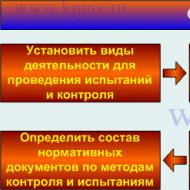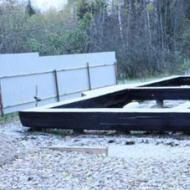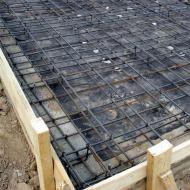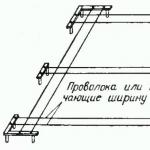
Testing laboratory accreditation. Construction business: what is a construction laboratory for? Business plan for the organization of a construction laboratory
Before embarking on the accreditation process for a testing laboratory, a number of preliminary steps must be taken. Further actions will depend on their result.
These activities include:
- determination of the purposes of accreditation. It is necessary to define precisely what the accreditation is for. The purpose of accreditation is directly related to the scope of accreditation. Accreditation of a testing laboratory is a costly undertaking, therefore, an erroneous definition of the purpose of accreditation can either unreasonably narrow the scope of accreditation, or, conversely, include in the scope of accreditation those areas of activity that will not be in demand;
- definition of the scope of the testing laboratory. The scope of a testing laboratory can be different. It is not always advisable to include all areas of activity in the scope of accreditation. The accreditation of a testing laboratory should be carried out for those types of economic activities, the products of which will be tested in the laboratory and will meet the purposes of accreditation. The field of activity can influence the form of accreditation. Depending on the field of activity, accreditation of a testing laboratory can be mandatory or voluntary;
- determination of consumers of laboratory services. The composition of consumers of testing laboratory services has a significant impact on the scope of accreditation. The wider the composition of consumers, the wider the scope of accreditation should be. However, it is not advisable to include all possible consumers in this composition. Consumers can be one-time with a minimum order value. In this case, it will not be economically profitable to maintain an open area of accreditation in this area;
- determination of the regions of operation of consumers of services. The region where consumers work influences the choice of the accreditation system. If the majority of consumers work in a limited region, then it is necessary to choose an accreditation system recognized in this region. If consumers operate in several regions or internationally, then the accreditation of the testing laboratory should be carried out in large regional or international systems.
After carrying out the preliminary measures, you can proceed to the next stage - determining the scope of accreditation of the testing laboratory.
Scope of accreditation of the testing laboratory
The scope of accreditation of a testing laboratory determines the types of work that a laboratory can perform on the basis of the issued accreditation. For testing laboratories, the scope of accreditation may contain two groups of test and control methods: destructive and non-destructive methods. The composition of the methods depends on the control parameters that are established in the regulatory documents for a specific type of product or materials.
The correct indication of the scope of accreditation is a key condition for the accreditation of a testing laboratory. In different accreditation systems, the scope of accreditation may be formulated in different ways. However, the procedure for determining the scope of accreditation of a testing laboratory has a similar set of actions.

To determine the scope of accreditation of a testing laboratory, you must:
- establish activities for testing and control. The activities are directly related to the scope of the testing laboratory. They can be determined according to various reference books and classifiers (depending on the system in which the testing laboratory is accredited). For example, for accreditation in the Russian national accreditation system, the types of activities are established according to All-Russian Classifier of Economic Activities (OKVED)... If the accreditation of the testing laboratory is carried out in one of the EEC accreditation systems, then the types of activities are determined by Statistical classification of economic activities of the EEC etc.
- establish objects of control and testing. Each type of economic activity has its own set of products, materials or services that are processed, created and applied in this type of activity. It is quite problematic to include the entire product range in the scope of accreditation. Testing laboratory accreditation is carried out for a limited range of products. To determine this composition, reference books of products and services are used. Product directories are interconnected with activity directories. To establish the objects of control and testing for accreditation in the "Rosaccreditation" system are used All-Russian Classifier of Products (OKP) and classifier Commodity nomenclature of foreign economic activity of the Customs Union (TNVED CU)... Other accreditation systems use their own reference books and classifiers;
- to determine the composition of the normative documents governing the parameters of the objects of control and testing. In most cases, for each of the groups of objects of control and testing, there are regulatory documents that determine the requirements for their safe application and use. Such requirements are contained in standards, regulations or norms. Examples of documents are technical regulations, GOSTs, SNiPs, EEC Directives, ISO / IEC standards, etc. Accreditation of a testing laboratory is carried out taking into account the use of such documents. They are specified in the scope of accreditation of the testing laboratory and should be applied in the course of the activity. If the required regulatory documents are not specified in the scope of accreditation, then the laboratory will not be able to carry out tests for compliance with the requirements of these documents;
- determine the composition of the parameters or indicators that will be monitored by the testing laboratory. A large number of control parameters can be set in regulatory documents. To determine the scope of accreditation, it is necessary to establish which specific parameters specified in a separate regulatory document will be controlled by the testing laboratory. The scope of accreditation may include all parameters or only a part of them;
- determine the types of control and testing for each of the controlled parameters. The control of the selected parameters requires the use of their own methods. There are situations when a parameter can be controlled by several methods. To accurately determine the scope of accreditation, it is necessary to select suitable control methods for testing objects and samples. The choice of the necessary control and test methods will affect the composition of the regulatory documents for the accreditation of the testing laboratory;
- to determine the composition of regulatory documents governing the use of the selected control and test methods. Many methods of control and testing are regulated in regulatory documents. They establish a uniform procedure and rules for testing and control. The accreditation of the testing laboratory is carried out for compliance with the requirements of these documents. It is they who set the level of technical competence of the laboratory.
Each accreditation system has its own "set" of elements, which is specified in the scope of accreditation of the testing laboratory. The above steps allow you to accurately define the scope of accreditation. In most cases, the results of these actions are documented and reported during the accreditation of the testing laboratory. They can be given in the application for accreditation or in the accreditation certificate.
Testing laboratory accreditation criteria
In order to successfully pass accreditation, a testing laboratory must fully comply with the accreditation criteria in relation to the chosen field of accreditation. When accreditation of a testing laboratory is carried out, the notified body verifies that the declared scope of accreditation is in full compliance with the established criteria. If the criteria are violated, it is most likely that the laboratory will not be able to pass accreditation.
The accreditation criteria for a testing laboratory in most accreditation systems include three groups: technical equipment and competence of the laboratory, the competence of personnel, and the effectiveness of the quality system. Each of these groups can be divided into several subgroups in relation to which a number of measures should be taken to prepare for the accreditation of a testing laboratory.
Accreditation criteria for a testing laboratory in terms of technical equipment
This group of criteria can be divided into four subgroups. In each accreditation system, they can be detailed down to the level of more specific criteria.

The criteria for the technical equipment and competence of the laboratory include:
1. Laboratory premises and environment.
A testing laboratory can only be accredited if it has the necessary testing facilities. Premises can be owned or leased. The requirements for the premises of the testing laboratory differ from the requirements for the premises for industrial or domestic purposes. The composition of these requirements depends on the test methods that are established in the area of accreditation of the testing laboratory.
Thank you for the kind words. It couldn't be easier to give advice that you don't want to follow. Moreover, there is no need to treat my words as the ultimate truth. I can be wrong in my judgments.
There is also GOST R 15.201-2000 regarding qualification tests. "The system of development and launching of products for production. PRODUCTS FOR PRODUCTION AND TECHNICAL PURPOSE. The procedure for the development and launch of products." it says
8.10 qualification tests are carried out according to the program developed by the manufacturer with the participation of the product developer and agreed with the customer (if any). The program indicates:
The number of units of products subject to testing and inspection based on their complexity, cost, reliability and other factors necessary for reliable estimates;
All types of tests corresponding to the periodic tests specified in the technical specifications, as well as other tests and checks, allowing to achieve the goal of qualification tests;
Place of testing.
It is allowed not to include in the qualification test program the checks of individual requirements of the design documentation, which cannot be changed in the course of work on putting into production.
8.11 Qualification tests are organized and carried out by the manufacturer (supplier) of products. Qualification tests are carried out by a commission, which includes representatives of the manufacturer, product developer, developers and suppliers of components and, if necessary, state supervision authorities and other interested parties (for example, insurance organizations, public organizations for the protection of consumer rights, etc.).
There is not a word about accreditation. But, because. Your products must meet the requirements of TR, then the commission should have included representatives of Rostechnadzor.
You can justify the refusal of accreditation by the absence of such a requirement in the ND, but, unfortunately, in market conditions, the customer may present his requirements even if they are not justified.
Because You will have to be accredited according to the requirements of the TR, and they are mandatory, then I think you will not pass by Rosaccreditation. I can't say anything about prices.
Because for accreditation, you will have to create a whole package of documents, then it would be quite reasonable to contact intermediaries.
P.S. I’m still waiting for someone more competent to enter our dialogue, but it’s summer, or something else ... Some time ago, people responded to such questions with the offer of their services, or advice to whom to turn for help.
Can rephrase the question. Who can help with testing laboratory accreditation?
We have opened our own testing laboratory accredited in the TR Certification System.
Many years of experience have repeatedly confirmed the need to create our own laboratory base for product testing. The opening of our laboratory will raise the status of the certification body, since our company will be able to vouch for the quality of laboratory tests. Laboratory tests are an integral part of product safety confirmation during product certification and declaration. The goods can enter the Russian market only after receiving documents confirming the safety of the products: certificates of conformity and declarations of conformity.
The testing laboratory is equipped with the latest testing equipment and measuring instruments for testing various types of products. The laboratory employs highly qualified specialists with the necessary work experience.
The laboratory conducts certification tests of products, as well as inspection and other tests in terms of safety indicators, purpose, electromagnetic compatibility and physical and chemical indicators.
Laboratory certification testing is one of the stages of the certification scheme. The research object is exposed to special influences and various analysis procedures in accordance with the current GOST, OST, TU, as well as the manufacturer's design documentation. Certification tests of products should be carried out only in special testing laboratories with an accreditation certificate. As a rule, certification centers or certification bodies cooperate with such laboratories.
The test results are set out in the certification test report. This document belongs to both the laboratory that performed the analysis and the customer of the test. And the research can be published only if both parties agree, since all information obtained during the tests is confidential.
The testing laboratory conducts product tests in accordance with the current GOST, OST, TU, as well as the manufacturer's design documentation.
The testing laboratory was accredited on September 30, 2010. Accreditation certificate No. ROSS RU.0001.21AB31. Location of the laboratory: Moscow region, Noginsk, st. Industrialnaya, 41.
Construction laboratory Is an institution in which various research works are carried out, consisting in checking the quality of all construction work and the materials used. During this process, procedures are performed such as: measurement, research, diagnosis, objective assessment, documentary analysis.
The main purpose of the construction laboratory is to conduct a comprehensive survey of structures and buildings. When examining the parameters of safety and quality of construction work, these procedures allow you to achieve an accurate result.
After all, the basis for a successful construction project is the reliability and the highest quality of the manufactured products. It is on these defining features that many businesses are relying on. However, in many respects everything depends on the order of the customers.
The main activity of the construction laboratory of the Center for Independent Construction Expertise
The laboratory's activities are based on determining the quality of construction work, with the aim of improving it, as well as checking the documentation. Thanks to diagnostics and high-level measurement, reliable and complete data on a specific object or material can be obtained.
Laboratory tests are carried out by independent experts using modern equipment of the highest quality. The institution examines directly the structures of structures, namely their components: certain parts of the structure; blocks, bricks, welding joints; reinforced concrete and metal structures; various lines of communication.
An extremely important stage in a construction project is the testing of the erected structure. Thus, the finished structure is tested for strength and safety using special equipment. Usually large holding companies, as well as private developers, turn to such institutions.
Construction laboratory functions:
- Checking the quality of building materials (bricks, blocks, connecting materials, reinforced concrete structures that are used in construction) for compliance with regulations, certificates, passports, specifications. And they also identify compliance with all parameters (compression, the specified indicator of moisture absorption and water permeability) of the incoming products.
- Determination of the physical, mechanical and chemical properties of local materials used in construction.
- Research of concrete and other mixtures, as well as construction products.
- Diagnostics and objective assessment of finished structures.
The study of building materials by the laboratory includes the following tasks:
- Testing of finished products (required for construction) on the territory of the laboratory or directly on the territory of the construction site.
- Diagnostics of finished structures using a non-destructive method.
- Determination of the quality of metal and reinforced concrete structures.
- Observation of the road construction process.
In order to accurately determine the state of the structure and its quality, specialists conduct independent construction studies in such cases:
- During the construction of new buildings and the reconstruction of old ones.
- When building new roads and repairing them.
- In emergency situations with structures, structures and networks.
Each ETL, which already has a corresponding certificate of registration with Rostekhnadzor, can safely carry out all the necessary measurements, tests, checks of electrical devices for compliance with their regulatory and technical documentation. After that, the electrical laboratory has all legal grounds to issue an opinion on the readiness of an object for operation or to eliminate all detected faults.
What is an electrical laboratory?
Now electricity has entered our lives so deeply that we do not appreciate it until the moment it disappears. For high-quality and uninterrupted operation of an electric line, you need to thoroughly know many subtleties. They relate to each of the services of the electrical network. Therefore, periodic monitoring of the entire electrical system should be carried out. It is produced thanks to a special electrical laboratory (ETL).
It checks all the devices that controllers, electricians, dispatching services and control operators have access to. More precisely, the electrical laboratory determines the state of all protective devices. With its help, you can also detect such a problem as a constant voltage on the equipment case.
The electrical laboratory also carries out routine checks of instrumentation. Thanks to the normal operation of the devices, you can be sure of a high-quality supply of electrical energy, accurate accounting of its losses and consumption.
All the protocols that are drawn up after the relevant tests have been carried out are very significant. They are required, for example, upon the delivery of a construction project. They will be able to help carry out a quick replacement of electrical wiring during the reconstruction of a building and, which is very important, to ensure the safety of the health of all people in it.
ETL opening
How to properly open an electrical laboratory up to 1kV? This question is asked by many who would like to check the normal functioning of various power supply elements, carry out tests and diagnose malfunctions. Today it can be opened not only by large firms, but also by any small organization.
Each such laboratory provides its services exclusively on the basis of the existing license. This means that the main stage is the registration process. Only thanks to the experience and the presence of this license, we can talk about the professionalism and quality of work performed by an employee of such a company.
On the whole territory of Russia, the work of an electrical laboratory is possible after obtaining a special permit from the "SRO".
But how to open a non-destructive testing laboratory? After all, not every company can issue a license, but only the one whose activities are carried out using high-quality serviceable equipment, subject to all existing rules and regulations. Specially created registration firms constantly monitor all these important points.
If the electrical laboratory opens for the first time, then it is granted a license for only one year. But when the license is renewed, the term is increased to three years. You should prepare for the fact that it will take you about one month to collect all the necessary documents. But, despite this fact, the services of such companies are always in demand. Therefore, you need not to hesitate, but to open your own business in this industry.
Registration process
How to register an electrical laboratory? This question worries many business leaders who are going to hand over their construction site for use, while not performing various contract work. Having your own electrical laboratory will save you money and time, but it will take some effort when registering it.
Any legal entity can register ETL. To do this, he needs to collect and submit a certain package of documents to Rostekhnadzor. Then comes the stage of training employees, during which they must thoroughly study their job responsibilities and learn how to accurately perform them. Professional development of employees is carried out once every five years. They must have an appropriate certificate for electrical safety, in which the tolerance group is not lower than the fourth and there is a special mark about permission to carry out measuring work in the electrical network.
The number of employees in this structural organization must be at least three people:
- head of ETL;
- his deputy;
- engineer.
In addition, everyone is required to undergo a physical examination.
To register ETL, you will need to buy special protective equipment: helmets, masks and dielectric gloves. They must be tested with high voltage without fail, as evidenced by a quality certificate.
The head of the electrical laboratory must collect the relevant documents about the personnel working for him:
- a copy of the diploma;
- original certificate of advanced training;
- a copy of the electrical safety certificate.
To register with Rostekhnadzor, you need the following:
- certificate of establishment of ETL;
- document establishing the person responsible for the electric power industry;
- confirmation of the appointment of the head of the ETL;
- certificate of the establishment of a commission to test knowledge and skills;
- ensuring safe working conditions and working condition of measuring instruments;
- responsible for the serviceability of "PPE";
- a document confirming the admission of a specialist to work.
Also, it is necessary to create technological instructions:
- for all employees of the electrical laboratory,
- on labor protection.
To this entire list, you will also need to attach the following papers: a copy of documents certifying that you are a legal entity, an imprint of the seal, a sample of your signature and the application itself for registration. It is worth remembering that each copy of documents must be certified with the blue ETL seal.
The term for consideration of the application is one month. After that, you will be able to receive your registration or the documents will be returned to you for revision (errors, absence of any documents, etc.).
ETL promotion
How can you check the certificate of registration of the electrical laboratory? This is done by filing an application with Rostekhnadzor.
Many production managers are faced with the question of how to promote their electrical laboratory? To do this, you can post ads on your own website or third-party Internet resources. The more people know about it, the more likely it is to receive orders.
Engineering Center "ProfEnergia" has all the necessary tools for high-quality measurement of insulation resistance, a well-coordinated team of professionals and licenses that give the right to carry out all the necessary tests and measurements. Having left the choice at the "ProfEnergia" electrical laboratory, you choose the reliable and high-quality operation of your equipment!
















